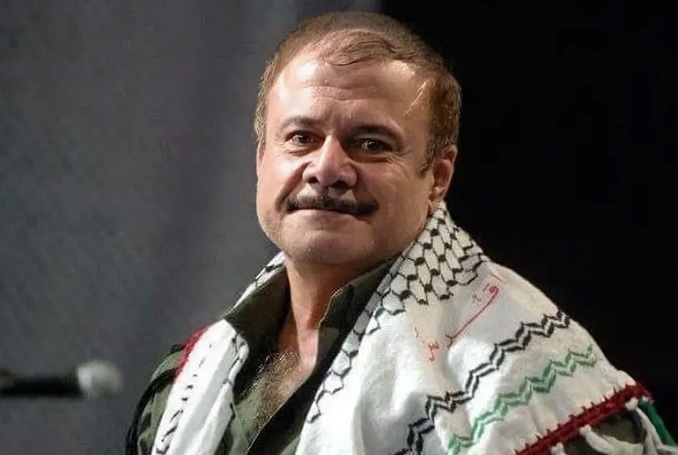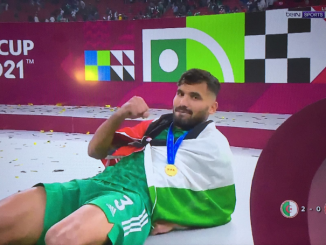
By Ramzy Baroud 
Whenever Israeli soldiers stormed our neighborhood in a Gaza refugee camp, we would rush to hide a few VHS tapes of Al-Asheqeen band.
Possessing such revolutionary contraband would be enough to earn one a severe beating, an arrest and a heavy fine.
This is why, when I learned that the leader of the band, the legendary Lebanese artist, Hussein Munther, also known as ‘Abu Ali’, had passed away on Sunday, September 17. I was overwhelmed with nostalgia.
‘O world, bear witness to what has happened to us, and to Beirut; bear witness to (our) popular struggle ..,” Al-Asheqeen sang about the Israeli invasion of Lebanon in 1982. I can’t imagine that a single child of my generation did not know that song by heart.
Munther died, but left behind a wealth of 300 songs, all dedicated to Palestine, and to Arab and global solidarity with the Palestinian people.
Munther was not alone. His fame, and influence, was part of the well-deserved popularity of the Al-Asheqeen band, roughly translated ‘Band of the Lovers.’
The reference to love here is to the love of the homeland, to Palestine and to Palestine alone.
The band, founded in 1977, has defined, more than any other, the relationship between Palestinians in the Shatat – diaspora – and those in occupied Palestine, with that of the homeland, with Palestine as an idea, a tangible reality, a history, a culture and much more.
The message of the band has helped Palestinians remain strong during the most difficult of times – the Beirut siege in 1982, the Sabra and Shatila Massacre, the relentless exile, the wars, the betrayal of friends and the cruelty of enemies.
The content of Asheqeen, often transmitted in the thunderous voice of Munther, was penned by Palestine’s most famous poets, the likes of Ahmed Dahbour, Mahmoud Darwish, Tawfiq Ziad, Nuh Ibrahim and Samih al-Qasim.
A quick scan of the historical and cultural references made by the band demonstrates that Palestine, for those beloved artists, was not a place in time, driven by a single faction or an ideology; it was Palestine as an eternal truth that remains, and will remain unchanged.
They sang for the Arab revolutionary Izz al-Din al-Qassam (1981); for Beirut (82); for the Shatat; for the ‘children of the stones’ (87), for the Intifada ..
They sang for Palestine, as a woman, Zareef al-Toul, tall and proud, beautiful, rooted in her land, legendary in her dignity and revolutionary in her resilience.
And who else could convey all of these sentiments in a framework of power and poise but Hussein Munther, who, interestingly – also tellingly – was a Lebanese artist, with a Shami accent, and a Palestinian heart.
Munther was an “Arab-Palestinian-Shami-Lebanese project of the highest caliber,” an Arab writer, Thahir Saleh, wrote at Aljazeera Net.
In fact, the entirety of the Asheqeen project was an Arab one, involving the late Abdullah Hourani, Hussein Nazik, Mizr Mardini, the sisters, Maha and Misa’ abu al-Shamat, along with a large number of Arab and Palestinian songwriters, performers, set designers and organizers.
The pan-Arabism of Asheqeen reflected a period of Arab revolutionary struggle in which the Palestinian cause didn’t belong only to Palestine, but to all Arab nations.
Most Palestinian political groups, including Fatah under the leadership of the late Yasser Arafat, contributed to this historical achievement.
Old videos of Asheqeen performances showed the top leaderships of major Palestine Liberation Organization (PLO) groups, all represented equally, sitting in the front row of the band’s concerts.
Munther and Asheqeen toured numerous Arab and international capitals for years, rightfully earning the title the ‘Voice of the Palestinian Revolution.’
Though many of those who helped form the band, many of its early participants, song writers, and now, ‘Abu Ali’ himself, have departed this earth, the songs of Asheqeen continue to resonate loudly in every Palestinian city, village and refugee camp. They are heard throughout Lebanon, in Syria and in many Palestinian and Arab homes the world over.
The greatest achievement of Hussein Munther and his ‘Band of Lovers’ is that they have demonstrated that revolution is not a rifle, but the culture that gives the rifle its actual meaning.
Moreover, they have helped cement the widespread values of Resistance among Palestinians as the only way to liberate the wounded homeland.
But the Resistance of Asheqeen and Hussein Munther, also known as ‘Abu Ali,’ is one that results from a collective and unrepented love for Palestine and her people.
(The Palestine Chronicle)

– Ramzy Baroud is a journalist and the Editor of The Palestine Chronicle. He is the author of six books. His latest book, co-edited with Ilan Pappé, is “Our Vision for Liberation: Engaged Palestinian Leaders and Intellectuals Speak out”. Dr. Baroud is a Non-resident Senior Research Fellow at the Center for Islam and Global Affairs (CIGA). His website is www.ramzybaroud.net







